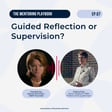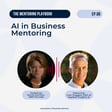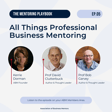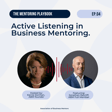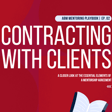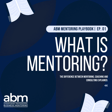Become a Creator today!Start creating today - Share your story with the world!
Start for free
00:00:00
00:00:01

The Financial Times Guide to Mentoring
In this episode of 'The Mentoring Playbook', our members-only skill development podcast, ABM founder Kerrie Dorman speaks with the authors of the 'Financial Times: A Complete Guide to Effective Mentoring', Dr. Ruth Gotian and Andy Lopata.
Andy Lopata shares his 'Mentoring Scorecard' tool, which allows you to measure the impact of your mentoring relationships and guides you through various steps of reflection to evaluate your mentoring practice.
Download the matching PDF resource to make the most out of this episode.
Recommended
Transcript
Intro
Introductions: Meet Ruth Gottian and Andy Lopater
00:00:32
kerriedorman
Well, good afternoon, and thank you all for joining me on the Mentoring Playbook podcast. And today, very excitingly, I have Ruth Gottian, author, educator, speaker, executive coach, and Andy Lopater, who is, as the FT says, one of Europe's leading business networking strategists. And Andy, you've written six books, you've got a podcast, You do all sorts of amazing things. But before we explore that, Ruth, may I start with you because you are actually in the States and you do all sorts of amazing things, including in
The Science of High Achievers: Insights from Ruth
00:01:15
kerriedorman
the world of mentoring. Tell us a little bit about what you do.
00:01:19
Dr_ Ruth Gotian
Hi, and greetings from New York City. Yes, I am a social scientist who studies extreme high achievers, Nobel Prize winners, astronauts, Olympians, CEOs to figure out what has made them so successful. And one of the things that I had realized and noticed in my research is that all of them, from the astronaut to the the bedazzled Olympic figure skater, every single one of them surrounds themselves with a team of mentors. So if it's good enough for astronauts and Nobel Prize winners and Olympians, I think the rest of us mere mortals should do it too. So I partnered with Andy and here we are.
Networking Mastery: Andy's 25-Year Journey
00:02:00
kerriedorman
That's amazing. And Andy, tell us a little bit about what you all the wonderful stuff that you do.
00:02:07
Andy
Well, I'm a professional relationship strategist and have been on celebrating 25 years in the world of networking and professional relationships. And as you mentioned, this is my sixth book. ah So I've written books on the topics of networking events and skills, referral strategy, ah professional relationships for leadership and vulnerability. So it's been ah a natural evolution, quite a journey in that sense. And I'll typically work with with um multinational companies and larger organizations, typically, not not exclusively, on how they build, nurture and leverage their professional relationships more effectively.
00:02:50
kerriedorman
And you two have come together specifically.
Co-Authoring Adventures: Ruth and Andy's Unique Process
00:02:52
kerriedorman
well I know that you've been you've' you've worked together for quite some time now on various projects, but this latest one is the Financial Times Guide to Mentoring. which you've co-authored.
00:03:06
Dr_ Ruth Gotian
Yes.
00:03:07
kerriedorman
So my my question to you two is firstly, before we go into the content of it, what was it like to co-author?
00:03:18
Dr_ Ruth Gotian
So I'm an academic, which means I co-author all the time, um but this was different. This was, I usually co-author with other academics and we have a process that we do it, but here we were taking two people who have never met in person. um two completely different styles. I don't write in British English. I had to learn how to do that. um And we were taking the professional guidance and underscoring it with academic research so that there's teeth behind everything that we're saying and recommending.
00:03:55
Dr_ Ruth Gotian
And it's not just a lot of hand waving.
00:03:56
Andy
Okay.
00:03:58
Dr_ Ruth Gotian
And we were able to do that seamlessly. And we actually really made it work. The time zone difference actually helped. because when I finished a part, then Andy was able to do it and by the time I woke up, he finished his edits and it just worked out better than I had ever imagined.
00:04:16
kerriedorman
Andy, how did you find the experience?
00:04:19
Andy
Well, it's the third time I've co-authored out of those six books and the first for many years. My first two books were co-authored in 2005 and 2006, so it's been a long time. This, with no disrespect to my previous co-authors, this was the the smoothest of the journeys.
00:04:37
kerriedorman
but
00:04:37
Andy
ah
00:04:38
kerriedorman
Because of the the time difference lending its way to
00:04:40
Andy
No, no, no. For me it was I Learned Lessons from my first book that we co-authored where we just each kept writing. I would start a chapter and Stephen would start a chapter and and Terry would start a chapter and then we'd all edit each other's whereas this I learned that that creates a hodgepodge of a book.
00:05:02
kerriedorman
Mm.
00:05:02
Andy
with no one clear voice. Whereas in this case, Ruth and I planned the chapters together, I would write, Ruth would then edit an ad, then I would edit, so we we had a consistent flow of an approach all the way through. um So that was one major difference based on that learning. I think that it's quite nice to have the balance of an academic and a storyteller writing together because Ruth adds that academic weight to what I do and maybe I added more of a creative bent perhaps but actually
Merging Expertise: Academic Rigor Meets Creative Storytelling
00:05:39
Andy
For an academic, Ruth is a very creative writer and a storyteller herself. um So maybe I got the best of that particular deal.
00:05:46
kerriedorman
Yeah, yeah.
00:05:46
Andy
um and ah So yes, interesting.
00:05:48
kerriedorman
I love one of the things that I ah really enjoyed about The Guide to the Book was that the the storytelling aspect of it all. So all the points I felt were culminated in a real life story.
00:06:04
Dr_ Ruth Gotian
Yeah. Yeah. And it's incredible stories. It's stories of luminaries of Bob Lefkowitz, a Nobel Prize winner, and Nicole Stott, the astronaut, and also regular people who don't have those accolades, who share how incredible mentoring and the incredible difference it made in their lives and how they went about it. I think that partnership where we got corporate examples and some examples from my academic work, it really brings all the data to life. And more importantly, it teaches everyone how to implement these strategies immediately. So it's not just some some big flowchart that people need to figure out. There's to-do lists, there's worksheets, there's infographics, everything that people could start implementing.
00:06:55
Dr_ Ruth Gotian
And I think one of the for me, one of the main reasons that Andy and I worked so well together is that we knew what our strengths were, and we played to our strengths.
00:07:06
kerriedorman
Mm.
00:07:07
Dr_ Ruth Gotian
And in the process, we learned from each other. So for example, Andy, I think, is the expert at knowing all these tools and websites to create tools and apps, et cetera. Anything I said that had a power button, Andy was the expert. And I learned from that how to take my data and have it tell a story from working with Andy. So I definitely finished the process better than I started.
Why Buy the Book? The Value Beyond Free Content
00:07:33
kerriedorman
Well, that that leads me on very nicely to introduce the topic of the tool, the the mentoring school card tool and that is going to accompany this podcast, Andy. But i before we explore that, I have a little bit of a challenging question for you.
00:07:52
Andy
Mm.
00:07:53
kerriedorman
And it is this, why should someone by this guide, the Financial Times Guide to Mentoring, when in this day and age we have so much free content available to us through the internet.
00:08:10
Andy
I think there's a number of reasons why you might choose to buy a book rather than research. And and you know the internet and Google have been around for a long time. OK, AI has in and enhanced the experience to a degree, albeit in its infancy. um But we like reference guides where we can just, we have a trusted guide where we can just reach out, pick it up, go to a favored section and refer back to it at certain points. There's that flow of information ah rather than getting things piecemeal through a web search, you've got a flow of information in one voice.
00:08:46
Andy
I sort of say one voice with a smile, having just talked about co-authoring.
00:08:51
Dr_ Ruth Gotian
Thank
00:08:51
Andy
But we do come together in one voice in in the book.
00:08:52
kerriedorman
ah
00:08:55
Andy
So you've got that consistency, which I think gives context as well, because you might do a search and find one piece of information from one expert, a conflicting piece of information from from another.
00:08:56
Dr_ Ruth Gotian
you.
00:09:08
kerriedorman
Mm.
00:09:08
Andy
what we've got is we're presenting our ideas and our thoughts on this and there were certain things that we we argued between us to come up with that voice, um whereas when you search you don't have that, yeah that filter is a lot harder to apply and at the moment AI is effectively um a very posh web search because it's drawing its information from everything that's on the internet.
00:09:35
kerriedorman
Mm.
00:09:35
Andy
So it just does that for you but there's no context, no filtering.
00:09:39
kerriedorman
Yeah, no, I would agree with that. I think that's an excellent answer, actually. And the one thing I just and i want to make sure that I say is that you you both got a lot of respect from me because you went out to your wider network and asked for advice and feedback on the content, myself included, which is why I know you did it. and And so i I just thought that that was fantastic. It was such an inclusive way of gathering so much information from people who you knew had a lot of content and and advice to give.
00:10:15
Dr_ Ruth Gotian
You know, Kerry, I used to be a dean for mentoring at an Ivy League medical school.
00:10:16
Andy
3.
Feedback and Refinement: How Experts Shaped the Final Manuscript
00:10:22
Dr_ Ruth Gotian
And I had to curate all of this information on mentoring and develop programs on mentoring. And I was pulling my hair out because the information was there on the internet and different books and articles and programs. But not everything I needed was in one place. It was all over the place. And I spent hundreds of hours trying to curate it and pull it all together. And I said, this is ridiculous. So when Andy approached me about writing this book, I said, this is the opportunity to write the book that I always wanted, always needed, but never had. And anyone who develops and runs mentoring programs, the information is here in one place. Now, in terms of sending the manuscript out for
00:11:12
Dr_ Ruth Gotian
to other experts, that's in academia, we call that peer review. We're not the only experts in the world.
00:11:16
kerriedorman
Thank
00:11:17
Dr_ Ruth Gotian
There are other people who have expertise and everyone has an expertise in a certain niche for this.
00:11:21
kerriedorman
you.
00:11:24
Dr_ Ruth Gotian
And if we can get all of their guidance, it just makes it stronger and makes it better. And we made modifications based on that feedback.
The Mentoring Scorecard: Evaluating Relationship Impact
00:11:34
Dr_ Ruth Gotian
So this is really, it's our work with the feedback of our peer reviewers. And I think this, it's My hope and my goal is that this is the go-to book for everyone who runs mentoring programs because it's all there.
00:11:49
kerriedorman
Well, it sounds like a bit of a no-brainer to me. But just just talking about the mentoring programs, though, Ruth, it does also include a lot of rich content for SME business mentors, doesn't it?
00:12:02
Dr_ Ruth Gotian
Absolutely. it's As I said, it's that book for anybody who If the expert wants to be the expert, runs the programs, bring and brings in experts, it's all there.
00:12:15
kerriedorman
Yeah, know amazing. Good, good. So now we're going to move on to the mentoring scorecard, Andy, which I have actually completed before.
00:12:19
Andy
you
00:12:24
kerriedorman
I found it very interesting, but could you just introduce the tool and tell us what it does?
00:12:29
Andy
Yes, I use a number of these assessments in my works. It was a natural extension of that and I found them very useful on a number of levels. ah What we're trying to do is help the user to measure their impact or the impact of their mentoring relationships, whether you are a mentor or a mentee. it can't be anything other than a generic tool for what it is, so you you know with anything like that you need to take um that feedback in context, but what it will do it splits the ah the question split into three key areas in terms of how you approach your mentoring and then it will score you for each but not only score you but based on your score it will give you some advice and some things to think about
00:13:16
Andy
in terms of making a better impact as a mentor or getting a better impact as a mentee. It's designed as a thought-provoking exercise. It's designed to get people to just take a step back and say, is this relationship working for me? Am I making the impact I need? Am I getting the value I want from this mentoring relationship? And if I'm not, what can we do to shift that? and then there's as I say advice in the scorecard and and hopefully it will encourage people if they haven't already to dig deeper into the book to find the answers as well.
00:13:51
kerriedorman
and So it's for mentors and mentees, is that right?
00:13:55
Andy
Yeah it is, it we we tried really hard just to pick key areas where we feel mentoring relationships might not always work effectively and you can look at it through either lens so it works both ways.
00:14:11
kerriedorman
I see. So it's perfect for a mentoring pair currently matched just to touch base and explore and reflect.
00:14:21
Andy
It would be very interesting to see how they they they each score the relationship and in the different areas.
00:14:27
Dr_ Ruth Gotian
Mmm.
00:14:28
Andy
um You know, doing it independently and then comparing their results, I think would be a very useful exercise.
Diverse Mentorship: Astronauts and Beyond
00:14:34
kerriedorman
Yeah, and insightful.
00:14:35
Andy
If a bit frightening for some people.
00:14:38
kerriedorman
Well, sometimes you've got to feel the fear and get on with it, haven't you? So the how long does it take, Andy?
00:14:44
Andy
it It's down to the individual. um It's 15 questions with a series of options that you pick, you know, between option one, two, three, four, five, six or seven, number of statements. So you'll get people that take it in two minutes because they're going through it and going on their gut instinct, this score, this score, this score, and you'll get people to take a quarter of an hour. because they are really thinking through every question and every scenario, which is probably the more effective way of doing it, but I wouldn't denigrate the other approach because gut instinct is a good good driver as well or a good indicator as well. um I would say the median time is between five and seven minutes.
00:15:25
kerriedorman
Okay all right so again that's a no-brainer too isn't it for for that amount of time commitment. um So thank you both very much for that insights to the to the book, the guide, the scorecard. I've got some other questions for you but just before I move on to to those, but where can one buy the book?
00:15:49
Andy
Well, um I always like to say all good booksellers and some rubbish ones too. um but you if you if you If you go into any bookstore, you can ask them to order it for you.
00:15:54
kerriedorman
a
00:16:02
Andy
Obviously, Amazon have it and all the other online bookstores like Waterstones and Barnes and Noble and so forth. If you go to mentoring-guide.com, ah We have links to some of the major booksellers ah in both the UK and the US and internationally.
00:16:19
kerriedorman
Ha ha ha ha!
00:16:22
Andy
um There's also, and I think this is UK only, there's an offer, 20% off the cover price through the Pearson website which is our publisher. So if you go to mentoring-guide.com then you'll be able to find it there.
00:16:39
kerriedorman
Amazing, thank you. Right, before we wrap up, Ruth, I've got a ah question for you. So I'm absolutely intrigued by the work that that you've done with super achievers. And I just wonder where an astronaut would find a mentor. ah I mean, the pool must be so small that, yes, tell me a little bit about that.
00:17:05
Dr_ Ruth Gotian
So first of all, the mentor doesn't have to be someone who's just like them. And that's one of the things that Andy and I talk about in the book. If you're an astronaut and you only surround yourself with other astronauts, you're going to be in an echo chamber.
00:17:17
Andy
Thank
00:17:20
kerriedorman
Mm.
00:17:20
Dr_ Ruth Gotian
But if you start opening up your mentoring team, yeah, you'll want to have at least one astronaut, but you also want people who are outside of the aerospace industry.
00:17:24
Andy
you.
00:17:30
Dr_ Ruth Gotian
And that's when you start learning about new ideas. the checklist that they have in operating rooms, that idea came from the aviation industry. And that's why we need to have that overlap and that crossover so we can hear how things are being done in other
Favorite Networking Quotes and Tips from Andy
00:17:49
Dr_ Ruth Gotian
sectors. That's where the great learning occurs.
00:17:53
kerriedorman
I absolutely love that. I think it's fascinating. okay And lastly, Andy, I've just got a networking question for you, seeing as you are one of Europe's leading business networking strategists.
00:18:02
Andy
And.
00:18:06
kerriedorman
the ah So I get your newsletters all the time. Connecting is not enough. And what I really get from it is the fact that you have to keep working and chipping away at building your network, building the relationships. But do you have one top tip for people in terms of networking before we say goodbye?
00:18:26
Andy
Yes, i will let me share my favourite quote with you. and It's from the the daughter of the former British Prime Minister, Lord Asquith, who was a poet and author, Elizabeth Asquith-Bibesco. And she said, blessed are they that give without remembering and receive without forgetting.
00:18:42
Dr_ Ruth Gotian
No.
00:18:43
kerriedorman
Hmm.
00:18:43
Andy
Give without remembering, receive without forgetting. take the transactional out of your relationships and focus on the abundance mentality and the support that you can give to others without focusing on the quid pro quo. But, and it's a very big but, you still need to have that strategic or transactional element in the background and understand what it is you're trying to achieve and how other people can help you get there. So it's ah about
00:19:14
Andy
being strategic in the background, but human in the way you you engage and interact with people so that you are leveraging networks effectively, but no one feels networked by you.
00:19:25
kerriedorman
Mm, amazing. Well, thanks again to both of you, Ruth and Andy. I wish you all the best with the book, The Financial Times Guide to Mentoring. And I hope our paths cross again very soon.
00:19:39
Andy
I'm sure they will, thank you very much.
00:19:41
Dr_ Ruth Gotian
Thank you.
00:19:42
kerriedorman
Take care. Bye.
00:19:44
Andy
i
